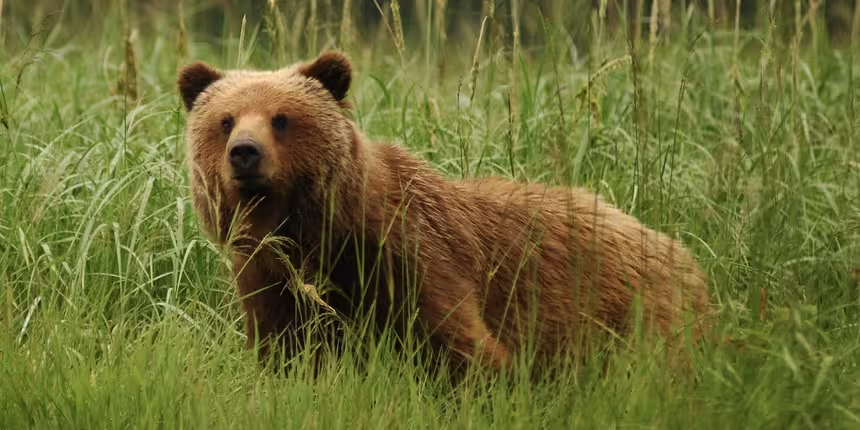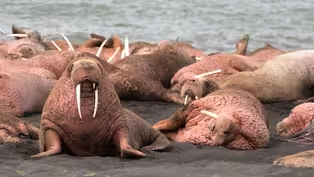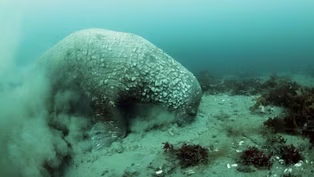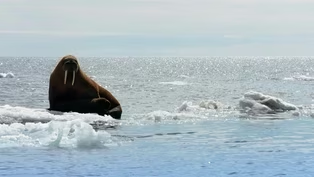
This Tiny Walrus Will Melt Your Heart
Clip: Season 44 Episode 1 | 2m 48sVideo has Closed Captions
An orphaned baby walrus, just a week old, gets a second chance.
This orphaned baby walrus, dubbed Little Miss Walrus, was found alone on a remote Alaskan beach, just one week old and covered in scratches. She’s now safe at the Alaska SeaLife Center, the only place in the U.S. equipped to care for orphaned walruses, and the 10th calf they’ve rescued since 1998.
Problems playing video? | Closed Captioning Feedback
Problems playing video? | Closed Captioning Feedback
Major support for NATURE is provided by The Arnhold Family in memory of Henry and Clarisse Arnhold, Sue and Edgar Wachenheim III, The Fairweather Foundation, Charles Rosenblum, Kathy Chiao and...

This Tiny Walrus Will Melt Your Heart
Clip: Season 44 Episode 1 | 2m 48sVideo has Closed Captions
This orphaned baby walrus, dubbed Little Miss Walrus, was found alone on a remote Alaskan beach, just one week old and covered in scratches. She’s now safe at the Alaska SeaLife Center, the only place in the U.S. equipped to care for orphaned walruses, and the 10th calf they’ve rescued since 1998.
Problems playing video? | Closed Captioning Feedback
How to Watch Nature
Nature is available to stream on pbs.org and the free PBS App, available on iPhone, Apple TV, Android TV, Android smartphones, Amazon Fire TV, Amazon Fire Tablet, Roku, Samsung Smart TV, and Vizio.
Buy Now

Explore More Ways to Watch
Bring the beauty and wonders of wildlife and natural history into your home with classic NATURE episodes.Providing Support for PBS.org
Learn Moreabout PBS online sponsorship- [Caretaker] You lift.
All right, let's bring the cart closer.
- [Narrator] The Alaska SeaLife Center is the only place in the country to take in baby walruses.
10 orphans have come through its door since it opened in 1998.
And now, they have a new one.
- Wanna come on out?
(walrus barking) - [Narrator] This one-week-old baby was discovered alone on a beach in the far north of Alaska in 2024.
She's covered in scratches and puncture wounds, probably from rolling around on the rocky beach.
(walrus blows nose) - Ooh!
- Oh, got that on you.
- That got on you!
- Oh, yeah.
- [Narrator] She's a snotty-nosed kid.
- On video!
(laughs) - [Narrator] That's one way to get a sample!
(walrus barking) - [Carrie] I'm pretty confident this calf would not have made it.
She was clearly alone for a period of time.
She was already malnourished.
But the biggest sigh of relief I have was her being good about taking food from a bottle.
It makes a world of difference.
- [Narrator] It's a critical time for this baby walrus.
Three of their previous orphans were so ill that they died.
Few orphans are as lucky as Little Miss Walrus.
After a month at The Alaska SeaLife Center, things are looking up.
- [Jane] Her skin's looking much better.
Things are starting to heal, and she has energy.
We now have what was a sick, weak animal becoming very animated.
- [Narrator] Since she arrived here, Little Miss Walrus has put on 60 pounds.
She's ready to make a bigger splash.
- [Maddie] Come here!
Yay!
She really likes to do this little, throw yourself into the pool backwards thing.
And the look on her face is just like pure bliss.
- [Narrator] This orphan's rehabilitation is nearing its end.
It's time to move her to a permanent home.
Preview of Walrus: Life on Thin Ice
Video has Closed Captions
Preview: S44 Ep1 | 30s | See how the Arctic’s most enigmatic animals are coping as the sea ice melts. (30s)
The Weird Way Walruses Eat With Their Tongue
Video has Closed Captions
Clip: S44 Ep1 | 2m 44s | It was once believed that walruses dug for clams with their tusks, but the truth is even stranger. (2m 44s)
What is the Arctic Death Spiral?
Video has Closed Captions
Clip: S44 Ep1 | 2m 42s | Discover how rapidly declining sea ice is reshaping the future for walruses. (2m 42s)
Providing Support for PBS.org
Learn Moreabout PBS online sponsorship
- Science and Nature

Explore scientific discoveries on television's most acclaimed science documentary series.













Support for PBS provided by:
Major support for NATURE is provided by The Arnhold Family in memory of Henry and Clarisse Arnhold, Sue and Edgar Wachenheim III, The Fairweather Foundation, Charles Rosenblum, Kathy Chiao and...



